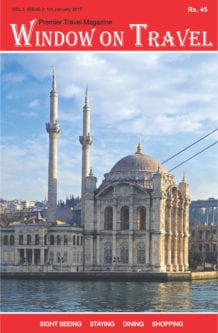
WoT's Hot
Dust UnderHer FeetbySharbari Zohra-Ahmed, Tranquebar 2019
Sharbari Zohra-Ahmed was just in Kolkata for the Times of India Literary Fest, had a book event at the PrabhaKhaitan Foundation, and was at a couple of book stores for book signing events.
Her first novel, Dust under Her Feetis a love story” told in “fits and starts, with “delays, disruptions and sudden diversions, because that is the nature of love stories that happen during wars.”Sharbari Zohra-Ahmed’s story is set in the Bombay Duck, a “watering hole” in Calcutta in the forties. In the thick of World War II, British and American troops flocked to this nightclub, to hear beautiful women croon, to drink, dine, and pursue their love and sexual passions. By doing sothey conjure some semblance of normalcy in turbulent times, far away from home.Raging political storms including the Japanese bombing of Calcutta, and the Partition riots that ensued after the war ended and India gained its independence threatened the Duck and it is staff.
Yet the novel is much more than a love story between Yasmin Khan and Lt. Edward Lafaver, an American officerstationed in Calcutta. Their liaison from the get-gofaces innumerable hurdles, and both know they are involved in a hazardous game where the inevitable outcome will be loss. Yet, despite the high stakes, they are unable to extricate themselves from one another. Compelled by forces beyond their control theyeach undergo a personal metamorphosis, questioning deeply held prejudices, to meet one another without the cultural and political baggage each carries. Through their story Zohra Ahmed explores how love and the best of intentionsare often defeated by unexamined social and racial preconceptions. While their story is the central narrative, the book explores several other stories of love, betrayal and intrigue. Unbridled passion and brutality across racial and caste lines lead to consequences that reverberate far beyond the confines of the Duck.
Zohra Ahmed’s very strong protagonist,Yasmin Khan,is layered and defies convention. From a long line of courtesans, Yasmin bucks the trend to ownand operate her own establishment where she makes the rules and asserts control, sometimes through kindness but often more forcefully, bending her staff to her indomitable will.Yasmin is not only highly educated and urbane, fluent in English with her own political views,she is a consummate businesswoman who runs her enterprise with precision whiledefying established social norms. Patience, Yasmin’sclose childhood friend and confidant, describes the Duck as “Yasministan” where Yasmin not only insists “there is no caste, no god is held higher than the other, the sexes are equal, but the rupee, above all, reigns supreme.”
The exquisitely chiseled and seductive Patience Cooper, an Anglo-Indian, performs nightly at the Duck where her Western beauty, style and sauciness captivates the soldiers.The staff of the Duck includes Muslims, a Dalit, a Parsi and Hindus and together they form an unusual and tight-knit family. Each holds an unenviable positionin the predominant rigid class and caste system of Colonial Calcutta but can be true to themselves at the Duck. The inherent dignity of each of the characters comes through vividly as the novel unfolds.
Yasmin, an avid reader with a searing intellect not only chafes against caste and race prejudice in India, she subtly rebels and finds her own way to address racial and social hierarchies thatoperate both among the American and British troops she serves. She distinguishes between the hypocrisies inherent in both British andAmerican race consciousness and relations. Yasminbristles when Patience “passes” for White and isaccepted and treated differently than other Indiansand is unafraid of calling a spade a spade. She calls Edward out when he does not treat her as an equal. To her surprise, and against her shrewd business instinct, she finds herself insisting on attaining justice for 3 Black servicemen with whom she becomes acquainted.
Both Yasmin and Patience, the primary characters,defy dominant stereotypes of the courtesan, the good and chaste Muslim woman and the “loose” Anglo-IndianThe gentle and adoring Patience dotes on her more worldly friend upon whom she sometimes depends too much and pays a price for doing so. Their strong bonds of friendship and the support they provide one another through a tortuous relationship, though unpredictable, proves to bethe most enduring and meaningful relationship for each of them. Their dependence on one another emotionally is palpable. Through their friendship the novel addresses issues of broken trust and the challenges of healing and restoration as well as the rewards of reconciliation between friends. The critical role of friendship between women is underlined – in the end it is what both women needed most.
Each character, the girls and the clients, are approached with empathy and compassion. The author suspends criticism and moral judgement on issues of sensuality which is refreshing. For me, the circumstances of each situation that triggers a response, rational or irrational, were certainly understandable and compelling.The morality and sense of honor and duty towards one another among the staff of the Duck questions time-honored notions of who and what is upright and worthy of respect.
The final section of the book, Part 4, (which thankfully is very brief), is where Zohra-Ahmed zooms forward from Calcutta of the 1940’s to 1962 in America. In a rapid telling we learn where each of the characters has landed in their lives, several continents apart. This was the only part of the book that I felt was perhaps too tidy. I would have preferred the story to end with the termination of the War leaving me to conjure many possible endings. However, there are readers who prefer resolution and happy endings.
Dust UnderHer Feet is botha fun and intriguing read. It is at once smart and insightful, filled with compassion as well as irony and wry humor. I thoroughly enjoyed and appreciated Zohra-Ahmed’s insights as well as her pithy yet subtle social and political commentary. It is a fine debut novel.
Sharbari Zohra-Ahmed was just in Kolkata for the Times of India Literary Fest, had a book event at the PrabhaKhaitan Foundation, and was at a couple of book stores for book signing events.
Her first novel, Dust under Her Feetis a love story” told in “fits and starts, with “delays, disruptions and sudden diversions, because that is
Other Articles in KULTURY VULTURY WOT
What to read next
Featured articles

Welcome Festive Season in Glam, Latin Quarters Launches new #PujoBling Collection with Monami Ghosh
by WOT








































